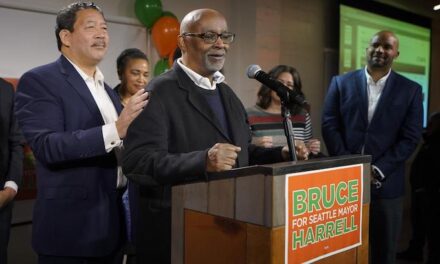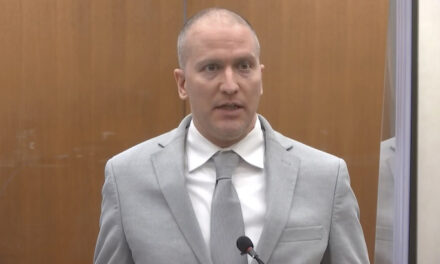Assemblywoman Wendy Carrillo, D-Los Angeles, was leading a hearing in the California Legislature when a caller began speaking Spanish over the public comment phone line.
“Hago un llamado para pedir a los legislators que aseguran que los trabajadores excluidos del seguro de desempleo ser un mayor prioridad este año,” the caller said.
Carrillo, without missing a beat, translated the comments.
“That was Vanessa Terán, who was calling for advocacy for underemployed or unemployed undocumented workers, which have been categorically underrepresented and not a part of the solutions when it comes to COVID recovery,” Carrillo said. “So we hear you and I understand your concerns. Thank you.”
It doesn’t always go so smoothly when language becomes a barrier in state government.
California has the largest population of residents who speak other languages at home. But even at the highest levels, the state has trouble providing language access to those seeking to participate in civic life.
And the pattern holds for people trying to obtain government services and benefits at agencies like the Department of Motor Vehicles.
The problem is so pervasive that even lawmakers like Carrillo, who is bilingual and grew up speaking Spanish at home, end up performing extra work to make sure non-English-speakers are included.
“Coming from a Spanish-speaking household, and as a child translating for my parents, I understand on a personal level just how difficult it is,” Carrillo said. “And also how challenging and difficult it is to feel that you can be heard in a space like this.”
California language diversity
With over 200 languages and dialects spoken across the state, California is one of the most linguistically diverse regions in the world. That distinction continues to complicate the dissemination of critical information.
About 44% of California households speak languages other than English at home — more than double the national average of 21.5%, according to the U.S. Census Bureau.
Statewide, most households that fall into this category speak Spanish, followed by languages from Asia and the Pacific Islands, Census data shows.
La Abeja, a newsletter written for and by California Latinos
Sign up here to receive our weekly newsletter centered around Latino issues in California.
California’s percentage of households that speak languages other than English far exceeds even states with similarly diverse populations, like Texas and New York. About 35% of Texans speak other languages at home, as do 30% of New Yorkers.
At a subcommittee hearing last Wednesday Asian Americans were highlighted as one of the groups most affected by language access issues.
“Asian Americans are a diverse population, belonging to dozens of ethnic groups with significant linguistic diversity that puts them at continuous inequitable disadvantage in regards to representation and resource allocation,” said Faith Lee, a legislative director for Asian Americans Advancing Justice California.
About one-third of Asian Americans speak only English in their homes, according to the Pew Research Center. The remaining 66% speak a language other than English. Asian Americans also have the highest rates of limited English proficiency at 35%, according to a report from the Center for American Progress. The Census Bureau defines limited English proficiency as those who do not speak English “very well.”
Lee said language access was identified as the most urgent issue in a recent Asian Americans Advancing Justice California survey of 57 community organizations. Limited English proficiency often results in barriers to services like health care, mental health and employment assistance.
Lee pushed for the state to avoid solutions that rely on digital translation tools, such as Google Translate, and set standards to provide a minimum number of interpreters and translators.
“We should also raise the floor and language access of compliance across state agencies rather than having to push for compliance agency by agency,” Lee said.
Outdated language access law
California has a 1973 law, the Dymally-Alatorre Bilingual Services Act, that requires state agencies that serve populations in which 5% of people speak languages other than English to have bilingual staff and translate documents.
However, it has not seen substantial updates for decades, and the COVID-19 pandemic showed that it has become increasingly outdated as the state’s population has changed.
Advocates also point to the law’s vagueness and limited oversight, which can lead to governmental entities not complying with requirements. Some county and city agencies were not aware the law existed and did not have plans in place to comply, according to a 2010 report from California State Auditor’s Office.
At times, officials have used Dymally-Alatorre’s outdated limitations to cut language access. And residents who speak languages other than English face an uphill battle to improve access.
The DMV — which had been offering written driver’s license tests in 32 languages — moved in 2021 to narrow that list to just the seven required by Dymally-Alatorre as part of a “Knowledge Testing Modernization project.”
Although the DMV ultimately opted not to make the change, it’s a clear example of how Dymally-Alatorre standards can work against greater language access.
In another case, language advocates had to undertake a years-long effort to improve poor language access for residents seeking unemployment benefits through the Employment Development Department.
Nonprofits in July 2020 filed a Department of Fair Employment and Housing complaint against the EDD, and a September 2020 report commissioned by Gov. Gavin Newsom showed that EDD claimants who “speak languages other than English have a difficult, if not impossible, time navigating the unemployment application process.”
A 2022 settlement between advocates and the EDD and a $21 million budget allocation requires the agency to improve services for non-English-speakers with phone interpretation services, document translation and online multilingual access portals.
Advocates, lawmakers push for better language access
In the Assembly, committee chairs can request interpretation, but only with advance notice, said Katie Talbot, spokeswoman for Assembly Speaker Anthony Rendon, D-Lakewood. Hearing agendas are available only in English, she said.
“If there is an individual who needs translation or disability accommodation, we encourage them to reach out to the Committee Chair or the Assembly ADA Coordinator in advance,” Talbot said in an email.
Despite fluency in English, Vanessa Terán has intentionally spoken in Spanish for about the last two years when giving public comments at Assembly subcommittee hearings.
But each time, no translation was provided after the comment. That changed after Carrillo translated Terán’s comments at a budget hearing last February.
“That’s the first time that I felt recognized as a constituent, as a community member and as an ally by a legislative representative,” said Terán, a policy director at Mixteco Indigena Community Organizing Project, the largest indigenous serving organization in California.
Terán uses Spanish to ensure that limited English-speaking groups, particularly indigenous communities, are accounted for. The goal is to encourage diverse populations to feel comfortable participating in government services. Terán called not allowing someone to speak their native language a “theft.”
“If I don’t set that example, no one else is going to do it,” said Terán. “And we’re never going to open up an opportunity for someone else to do it in their language.”
Currently, Terán said the state government is not structured as a “participatory system” for everyone. Terán recalled instances where children in Spanish-speaking households will often serve as interpreters for parents navigating public hearings.
Carrillo said she feels a “certain level of responsibility and accountability” to translate for callers commenting in Spanish, to make sure their communities and issues are represented, particularly essential and low-wage workers seeking support.
“The second level of responsibility that I have felt in chairing the hearings has been the importance of my colleagues to understand what is being said,” Carrillo said. “And for the audience, and for those watching and listening, to understand what is being said. Because when you don’t, you don’t understand the urgency behind the request or the ask.”
She said it’s not necessary to “reinvent the wheel” when it comes to improving interpretation at legislative hearings.
“Financial institutions already have different translation and interpretation services, even over the phone,” Carrillo said. “We can try to test things out in terms of what works best when someone is here in person. Or if we continue to use the remote calling system … I think we currently use an AT&T service. That service also provides an interpretation opportunity as we move forward.”
Possible solutions?
Carrillo and Assemblymembers recently discussed the state’s need to improve its language access at a budget subcommittee hearing.
The 2022 budget provides $5 million for a Government Operations Agency language access pilot program, which will select one department to test new practices. Some of the money will also go towards “translation for state administrative and legislative hearings to overcome language and cultural barriers to government services,” a committee staff report said.
Both Carrillo and Assembly Budget Chair Phil Ting, D-San Francisco, talked about their experiences growing up in households with families that didn’t speak English at home.
“We grew up where we speak languages other than English at home,” Ting said. “It’s not uncommon and so I think it is very important.”
Carrillo compared needed language access improvements to “trying to patch a roof during a storm.”
“And there comes a point where we just need to replace the roof,” she said. “And that’s something I think that we’re trying to manage and deal with, while at the same time trying to really create opportunities for us to have the right type of staff and resources to actually move a political agenda forward that really it truly is about equity and language and cultural access and competency.”
©2022 The Sacramento Bee. Visit sacbee.com. Distributed by Tribune Content Agency, LLC.
—-
This content is published through a licensing agreement with Acquire Media using its NewsEdge technology.



















Poem Statue of Liberty,
“… “Give me your tired, your poor,
Your huddled masses yearning to breathe free,
The wretched refuse of your teeming shore.
Send these, the homeless, tempest-tost to me,
I lift my lamp beside the golden door!”
n/a
Source: Emma Lazarurs: Selected Poems and Other Writings (2002)
Democrat Former President, Barack H. Obama Was Supposed to Have Said, ” America Is, And Always Will Be, A Land of Immigrants.” To Paraphrase Barack H. Obama.
The Only Problem Is That This in America, There Should Be More Native- Born, Americans Than Foreign-Immigrants, otherwise America is just another piece of land, and not America anymore.
WHEN reagan had control over BOTH THE HOUSE AND SENATE, they should have mandated ENGLISH AS THE NATIONAL language, and made it law, that ONLY ENGLISH CAN BE on govt forms, spoken at govt events etc….
Ther was a time when becoming a citizen also entailed learning English, though my grandparents and great grandparents spoke German the rule was, “we will speak English because we are in America!” That idea has gone by the boards, liberal education has a lot to do with it in the name of diversity, everyone has to be part of a group that can be catered to; the idea of melting pot is gone, it’a all about the differences which can be used to keep people divided and what better way is there than keeping them from having a common language. It’s the reverse of the tower of Babel, they’re afraid if the people understood each other they would find what they have in common and not be swayed by the racial, ethnic, sex divisions used to prey on them.
That is because since iirc, the late 80s, the left has pushed and pushed to REMOVE THAT english as a requirement, from ALL aspects of society, WHILE AT THE SAME TIME pushing that WE MUST SPEAK TO FOREIGNERS IN OUR Own damn lands, in their NATIVE tongues…
:All out of respek’…
SORRY BUT WHERE THE HELL is their respect for OUR NATION and our laws?!
One, if we didn’t know better, might think this deep concern about the poor immigrant not functioning in ENGLISH-speaking America was really about the poor people who didn’t speak English as their native language when all of a sudden this language problem can only be solved by spending more money, [ TAX PAYERS MONEY,] that’s why Wendy Carrillo went to ‘–THE BUDGET COMMITTEE.IT It was all about money.
AND how many of these ‘poor immigrants’, have LIVED HERE 10 + YEARS?? Surely by now, they should have learned the bloody language!
This is America,,,you do have a right to speak english, and pay for your own lawyers, advocates, food, clothing , housing and medicine. Whoever pays for these items is the one who owns the person. Just how cheaply do you sell yourselves and who do you choose for a master? If residing in Biden, it’s time to go into hiding.
In “The LAW, Frederic Bastiat on page#3o, says this, ‘But the law- the Government, … is not a beast that fills itself with milk. Nor are the lacteal veins of the Law,…THE GOVERNMENT, supplied with milk from a source outside the society: Nothing can enter the Public Treasure for the benefit of one citizen or one class unless other citizens and other classes have been forced to send it in…” Immigrants Going on “Welfare.”
Teddy Roosevelt: “No Room in This Country for Hyphenated Americans” “There is no room in this country for hyphenated Americanism. When I refer to hyphenated Americans, I do not refer to naturalized Americans. Some of the very best Americans I have ever known were naturalized Americans,… a hyphenated American is not an American at all.” 5 “This is just as true of the man who puts “native” before the hyphen as of the man who puts German or Irish or English or French before the hyphen. Americanism is a matter of the spirit and of the soul. Our allegiance must be purely to the United States. We must unsparingly condemn any man who holds any other allegiance.” .” “The one absolutely certain way of bringing this nation to ruin, of preventing all possibility of its continuing to be a nation at all, would be to permit it to become a tangle of squabbling nationalities, an intricate knot of German-Americans, Irish-Americans, English-Americans, French-Americans, Scandinavian-Americans, or Italian-Americans, each preserving its separate nationality, each at heart 15 feeling more sympathy with Europeans of that nationality than with the other citizens of the American Republic.” “The men who do not become Americans and nothing else are hyphenated Americans; and there ought to be no room for them in this country. Theodore Roosevelt Address to the Knights of Columbus New York City- October 12th, 1915
Multi-lingual nations wind up failing, or becoming second rate nations. Examples of failures include Yugoslavia and the Austrian-Hungarian empire. Second rate lands include places like Afghanistan, and to a lesser extent, Canada. Ukraine is currently struggling to maintain its identity – if they’re smart, they’ll adopt one official language (not Russian).
Once again, the multi-culturalism crowd is ruining the nation with their nonsense!
Nicely put.
California Is the Land of OX The Land of. Make-Believe, Maybe, In Land Of OZ, an Interpreter is acceptable and needed but not in America where ENGLISH, is the language. America Doesn’t Need Immigrants, Immigrants Need America, To Paraphrase Putin.
We have a nationwide epidemic with people—particularly educated ones—who can’t even comprehend it—in its most basic form.
I just heard a Commercial on the radio to learn spanish. Why should I learn their Language when they won’t learn ours. ???
Exactly. HELL< why should ANY US School, even TEACH Foreign languages..
UNLESS doing so, is an ELECTIVE class.. Not a mandatory one.